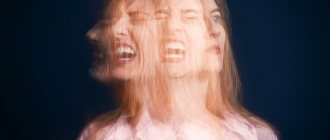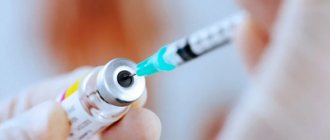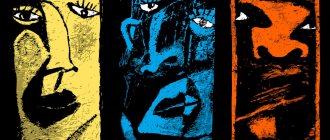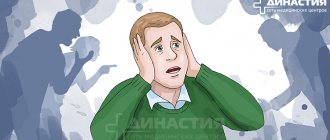Inappropriately elevated mood is a condition that is the exact opposite of depression. If it haunts a person for quite a long time and is accompanied by other inadequate or illogical manifestations, then it is considered a mental disorder. This condition is classified as manic and requires special treatment. Depending on the severity of symptoms, consultation with a psychotherapist or psychiatrist may be required.
At CELT you can get advice from a psychiatrist.
- Appointment with a psychiatrist with an extended interview, psychotherapy session - 4,700
Make an appointment
Features of the development of mania
In some cases, manic tendencies can be a personality trait, just like apathy tendencies. Increased activity, constant mental agitation, inadequately elevated mood, outbursts of anger or aggression - all these are symptoms of manic syndrome. This is the name given to a whole group of conditions that have different causes and sometimes different symptoms.
Both various life situations and incidents, as well as uncorrected pathological character traits, lead to the development of mania. A person prone to manic behavior is very often obsessed with an idea, he strives to realize it, even if it is unrealistic. Often the patient is driven by theories that have political, religious or scientific justifications. Quite often, patients show a tendency to be active in social and community activities.
A significant proportion of manic patients have so-called overvalued thoughts and ideas. Sometimes they can be global, sometimes these are ideas at the everyday level. From the outside, the behavior of patients talking about their ideas sometimes looks quite comical. If a highly valuable thought is global in nature, the patient, on the contrary, seems thoughtful and enthusiastic to others. Especially if he has enough education and erudition to substantiate his beliefs.
This condition is not always a pathology; it can be individual characteristics of the psyche. Treatment is necessary if overvalued thoughts and ideas get out of control and consume the patient’s entire life, in other words, interfere with the life of himself or those around him.
Why does it occur?
Two factors come into play here:
- genetic predisposition;
- constitutional factor.
People with manic syndrome often have inflated self-esteem and self-esteem. They often overestimate their talents and capabilities. Some of them can be persuaded by showing your own example, but many remain unshakable.
When do you need a doctor's help?
Manic syndrome is already a deviation from the norm, which is characterized by a number of symptoms that are more unpleasant for others than for the patient himself. This disease manifests itself as disturbances in mental activity and the emotional sphere.
Usually the behavior of a manic patient is incomprehensible to others and looks at least strange.
There are certain symptoms that indicate the need for medical attention:
- Extremely elevated mood, up to constant mental excitement and euphoria.
- Optimism that does not correspond to the situation, the patient does not notice real problems and is not inclined to experience a bad mood appropriate to the situation.
- Accelerated speech, accelerated thinking, lack of concentration on objects and phenomena that do not interest the patient. Therefore, with mania, learning is often difficult, when you have to pay attention to rather boring things.
- Increased mobility, active gestures and exaggerated facial expressions.
- Extravagance, pathological generosity. The patient can spend all his savings in a minute, without realizing responsibility for his actions.
- Insufficient control over behavior. The patient does not realize that his high mood is not appropriate everywhere.
- Hypersexuality, often with promiscuity (for example, a person who has never been prone to cheating before suddenly begins to flirt “indiscriminately”, enters into close relationships that he would never have dared to enter into before, even to the point of starting several novels in parallel or starting into a series of “short, non-binding relationships”, which later, after the episode of mania has passed, he will repent and feel shame and even disgust, sincerely not understanding “how this could happen”).
Treatment is complicated by the fact that the patient himself often does not recognize himself as sick. He considers his condition to be normal, subjectively pleasant, and does not understand why others do not like his behavior: after all, he feels better than ever before. It is difficult to send such a patient to see a doctor and persuade him to undergo therapy.
Manic
Mania as a personality quality is a tendency to a painful mental state with the concentration of consciousness and feelings on any one idea.
A maniac runs into the store and shouts: “I’m going to rape someone now!” Girl, what's your name? - Zina. - I won’t rape you. My mother's name is also Zina. What's your name, man? - Well, actually, Nikolai, but my friends call me Zina.
In an abandoned dark park, late in the evening, a man is sitting on a bench - over 2 meters tall, shoulders - slanting fathoms, pumped up - his T-shirt is already torn, camp tattoos, playing with a fin in his hand... A man approaches the bench - about fifty meters, thin, pale, reaching , intelligent glasses on his nose... He sits down on the bench. A man, in a powerful bass voice: “Eh, what kind of miracle is that?!” Goner, in a thin voice: - I am a maniac, a serial killer, I specialize in people like you, I already have 93 corpses on my account... The man, laughing hysterically, slides off the bench, rolls on the ground, blushes with wild laughter, and suddenly suddenly grabs his heart - and freezes. The goner, sighing sadly: - 94...
Manicity in the conditions of modern manic-depressive civilization is more the rule than the exception. If mania is the state of a person under the influence of the energy of passion, then depression is the daughter of ignorance. It, like a mirror, reflects a state of reduced physical activity, a twilight state of mind, when it seems to a person that everything is hopeless, that there is no meaning in anything.
V.G. Tushkin claims that the word depression literally means depressed, press - to crush, suppress. That is, a depressed state. A depressed state of the physical body, a depressed state of the psyche, and if we analyze this state from the point of view of the three gunas - goodness, passion and ignorance, then depression is a product of the guna of ignorance. That is, ignorance suppresses our activity. And therefore we see that people under the influence of the guna of ignorance are inactive, they are in such a very dissatisfied state. That is, the guna of ignorance is what hides, covers passion, so people are less active, have less energy and also covers goodness. Therefore they have less knowledge, less optimism, less understanding. That is, depression is a state when the soul is simply covered, it is not the soul itself. The soul is not sick, it does not have such a property, just like the sun, in the strict sense of the word - it cannot be closed. But it may seem to us that the sun is covered by clouds, although the sun itself evaporates water, creates clouds itself, and with this product of its own, this sun is hidden from us, that is, the guna of ignorance is what simply closes reality from us. And, as a rule, people end up in this state of ignorance and depression when they tried to act in the guna of passion, they had ambitions and they did not succeed. Their passion was without the control of goodness. Because without the control of goodness, this passion slowly turned into a state of ignorance. And there is only one way out from here - the development in oneself of a culture of goodness, spiritual knowledge.
Doctor, drawing a square and another one around it - Patient, what do you think this is? — A square room in which there is a square bed on which a man and a woman make love. The same question in relation to the picture: a triangle, and another one around it: - A triangular room in which there is a triangular bed (etc.) The doctor draws a circle, and another one around it - well, what do you think this is? ? The patient looks at the drawing and asks in an irritated tone: “Doctor, are you by any chance a sexual maniac?”
Unlike depression, mania is closely related to the energy of passion. Manic - a strong desire to achieve something turns into depression. The result is a kind of swing: from the energy of passion to the energy of ignorance. People are sometimes inspired, sometimes disappointed, sometimes inspired, sometimes despondent, sometimes showing enthusiasm, sometimes indifference and indifference. You can jump from this swing, falling under the influence of the energy of goodness, embarking on the path of spiritual development, personal growth and self-improvement.
Renowned psychologist Nancy McWilliams writes : “ People in a manic state or with a manic personality are famous for their grandiose plans, accelerated thinking and great freedom from ordinary physical needs such as eating and sleeping. They seem to be constantly at their best - until suddenly exhaustion sets in. Since a person experiencing mania literally cannot “slow down,” drugs such as alcohol, barbiturates, and opiates, due to their depressant effects on the nervous system, can be very attractive. It seems that many humorists and comedians have a hypomanic personality structure. However, their unrelenting wit can become completely exhausted. Sometimes the dysthymic side of such a humorous personality is more noticeable, such as in Mark Twain, Ambrose Byers or Lenny Bruce, who suffered from severe depression. Manic people are characterized by high energy, excitement, mobility, switchability and sociability. They know how to perfectly entertain and imitate, and are good storytellers and wits. This is highly appreciated by their friends, although sometimes they complain that they use humor to turn any serious remarks around and therefore it is difficult to enter into close emotional contact with them. When negative affect occurs in people with manic and hypomanic psychologies, it manifests itself not as sadness or disappointment, but as anger—sometimes in the form of a sudden and uncontrollable expression of hatred.”
Maniac at a psychiatrist's appointment. The doctor is trying to calm the patient. - Let me tell you a riddle: one color in winter and summer. - BLOOD!!!
- Vasya, why are you so unhappy, tortured? - Yes, you see, yesterday my friend and I were walking in the park, and there was a maniac there. - Sexy? - Bisexual.
Petr Kovalev Other articles by the author: https://www.podskazki.info/karta-statej/
Symptoms and signs of the disease
In addition to the signs listed above, there are several characteristic symptoms that unite almost all manic states:
- Tendency to thoughtlessly waste money.
- Tendency to make bad deals and gamble.
- Frequent violation of the law.
- Tendency to provoke fights and conflicts.
- Excessive alcohol consumption or addiction to other bad habits.
- Promiscuous sexual behavior.
- Pathological sociability - the patient often meets strange, suspicious individuals and spends time in a variety of companies.
If these signs get out of control, qualified medical attention is needed. It is important to understand that such behavior is not promiscuity, but symptoms of a disease that needs to be treated. Appealing to common sense is useless.
In some cases, the patient has a specific mania - for example, a mania of a special purpose. Then the patient is sincerely confident in his special mission and tries to implement it with all his might, despite the skepticism of others.
How to recognize the disease
Signs of mania vary, but the most common are the following:
- Megalomania.
- Crazy ideas.
- Reassessing your capabilities.
- An obsession with protecting oneself.
- Sexuality increases.
- Appetite increases.
- Distractibility appears.
Mania is a mental disorder that requires special attention. A psychological test that can be done at home will help you understand whether you are susceptible to this disease.
Types of manic states
There are several classifications based on the manifestations of mania and their content.
Based on content, the following types are distinguished:
- Persecution mania is accompanied by paranoia. The patient is convinced that he is being persecuted; anyone can act as a persecutor - from relatives and friends to the intelligence services.
- Mania for a special purpose - the patient is sure that he needs to create a new religion, make a scientific discovery, save humanity.
- Delusions of grandeur are similar to the previous one. The main difference is that the patient does not have a goal, he simply considers himself the chosen one - the smartest, the most beautiful, the richest.
- Mania of guilt, politeness, self-destruction, nihilistic - rarer situations. Patients prone to alcohol abuse often experience mania of jealousy.
According to the emotional state, manic syndrome can be:
- Joyful mania is excitement, an unreasonably elevated mood.
- Angry – hot temper, tendency to create conflict situations.
- Paranoid – manifested by paranoia of persecution, paranoia of relationships.
- Oneiric – accompanied by hallucinations.
- Manic-depressive syndrome is characterized by alternating mania and depression.
With manic-depressive syndrome, intervals may alternate after an equal amount of time, or one type of behavior predominates. Sometimes the next phase may not occur for years.
Characteristics of manic disorder
A manic disorder (episode) is characterized by a period of at least one week in which there is increased expansiveness or unusual irritability, and particularly persistent goal-directed activity. During periods of exacerbation of the disease, mood disturbances associated with manic symptoms are clearly manifested, and they are visible to others (for example, friends, relatives, co-workers, etc.). People are in a heightened mood that is not typical for their usual state, which is manifested in the changed behavior of the individual.
Symptoms of manic disorder
Sick people are characterized by: unusual cheerfulness, increased distractibility, attention is significantly reduced, judgments are superficial, the attitude towards their future and present is not critical, not objective and often extremely optimistic. The person is in an excellent mood, they feel cheerfulness and a surge of strength, they do not feel tired. Their desire for vigorous activity manifests itself in different ways:
- take on several tasks at the same time, which do not achieve the goal,
- start spending money randomly, taking out loans, making impulsive purchases,
- interfere in other people's affairs.
Intellectual excitement manifests itself in:
- acceleration of thinking,
- a change in attention is expressed
- hypermnesia (memory exacerbation).
Patients with mania are extremely verbose - they talk incessantly, sing, read poetry, and preach. There are often “jumps of ideas” - thoughts and ideas constantly replace each other, but there is not a single completed thought or idea. Characterized by confusion, inconsistency in thinking and actions, often reaching incoherence. The intonations are usually pretentious, theatrical, and pretentious. Everything that happens, important or insignificant little things, is evaluated to an equal, over-significant degree, but attention does not linger on anything for long (hypermetamorphosis syndrome). Patients with mania tend to overestimate their abilities and capabilities:
- they discover extraordinary abilities in themselves,
- talk about the need to change professions,
- they want to become famous as a brilliant scientist, engineer, artist, writer, and often simply begin to pretend to be such.
As a rule, these are not persistent, overvalued ideas and delusions of grandeur. Patients often look younger, have an excellent appetite, and the need for rest and sleep is significantly reduced. Often, sleep may be completely absent, and sexual activity increases sharply. In manic disorders, there is an increase in heart rate, increased salivation and/or sweating, and disturbances in the autonomic system occur. These symptoms are quite serious and cause difficulty or disruption in a person’s professional, social, educational or life activities. The symptoms of manic disorder, although similar, cannot be the result of the use of psychoactive substances or their abuse (for example, alcohol, drugs, medications) and are not associated with the somatic state of the body.










